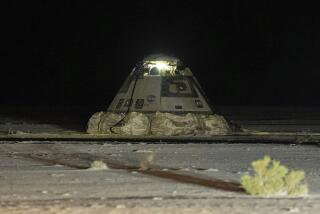Requiem for a Challenger : In Tribute, Let Us Keep Moving Into the Last Frontier
- Share via
In one instant the explosion of the Challenger united us in grief as we were reminded of the dangers of manned space flight, and at the same time it shook the complacency with which we have viewed recent shuttle flights. Tuesday’s accident etches into our memory the sacrifice that seven brave people made in pursuit of a better understanding of the universe.
As the immediate shock wears away we will begin to examine the specifics of the accident and its consequences for our manned space effort. Some of these consequences are already apparent.
The launch facilities will be shut down for an indefinite period as investigators comb the site for clues to the launch failure. Computerized launch-control programs will be pulled and examined countless times in search of some malfunction. An exhaustive search for every fragment of the spacecraft will be conducted, just as with major aircraft accidents, to aid in the analysis of various potential explanations of the tragedy. Only when the National Aeronautics and Space Administration is completely satisfied that the source of the failure has been found and corrected can we think of a resumption of the shuttle program.
Even as confidence in the launch program and facilities is being restored, the question of crew safety will be raised. The current orbiters, as we learned Tuesday, do not have the ability to separate the crew compartment from the body of the orbiter. Crew-safety concerns may result in changes in launch procedures or an actual physical redesign of the orbiter, the main shuttle engine, the solid rocket boosters or other components of the system. This will cause further delays in a restart of our shuttle-launch program. Even when restarted, with one orbiter lost, more time will be needed between launches as returning vehicles are inspected and prepared for the next flight.
In the short run these delays will cause a shift to our European “competitors” in the commercial space race. The French and German programs use unmanned launch vehicles, and are free of the concern for astronaut safety inherent in our shuttle program. With our space-transportation system temporarily shut down or running behind schedule, companies wanting to place satellites in orbit will seek out the European space programs.
As we move beyond these immediate consequences we will see a reexamination of our entire manned space effort as we balance future prospects against Tuesday’s loss. Will this examination reveal an essential role for men and women in exploring and using space, the last frontier facing mankind, or will it conclude that we should retreat to an unmanned space program? It is my hope that we will glimpse the vision of the future that led those seven heroic people into the cockpit of the Challenger on Tuesday morning.
This vision should lead us to renew our commitment to manned efforts in space and redouble our efforts to solve every problem that stands in the way of those efforts even in times of fiscal restraint. As with the tragic loss of the Apollo 1 astronauts 19 years ago, we will come out of this with a better program.
The first priority after identifying and correcting the problems of Challenger should be an examination of the replacement of Challenger with a fifth orbiter. We should then push the development of the next generation of space vehicles--the hypersonic spacecraft that is now in the conceptual design phase, which will be able to take off and land much like current commercial airliners and ascend directly into space. The plans for a manned space station must be continued on schedule. Research into space manufacturing, such as the development of new drugs and new industrial materials, must be pursued along with other commercial space activities.
The Challenger mission was the latest step in a journey that we started nearly 30 years ago. We must view the exploration of space with the same excitement and sense of opportunity that moved those seven men and women who perished Tuesday to seek the shuttle assignment. There is no other course open to Americans who would say, in the words of President Reagan on Tuesday, “Give me a challenge and I’ll meet it with joy.”
More to Read
Sign up for Essential California
The most important California stories and recommendations in your inbox every morning.
You may occasionally receive promotional content from the Los Angeles Times.













